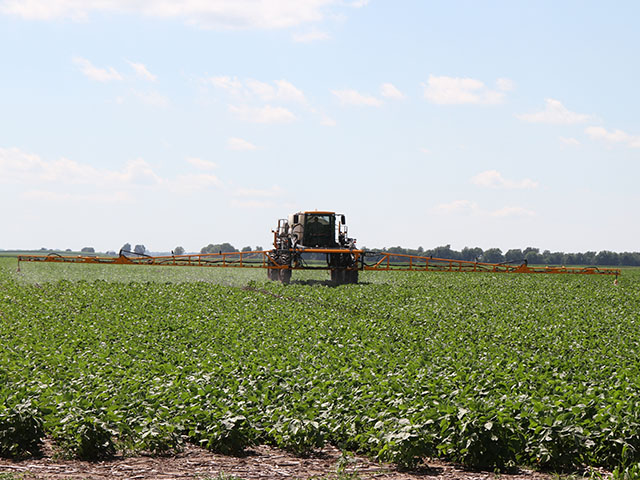No Reversal on Dicamba
Judges Deny BASF's Motion, Dicamba Registrations Remain Vacated
ROCKVILLE, Md. (DTN) -- Late on June 25, a panel of judges on the Ninth Circuit denied a motion by BASF to stay and recall their June 3 mandate vacating three dicamba registrations, including BASF's Engenia herbicide.
The move puts dicamba registrants back where they started the month: with three of four over-the-top dicamba herbicides no longer federally registered for use.
For now, farmers and commercial applicators may still apply any existing stocks of the herbicides in their possession as of June 3, according to an EPA cancellation order issued June 8. They must follow the former labels, as well as any dicamba-specific state rules in place, including some cutoff dates that have already taken effect.
But beyond 2020, the future of the three dicamba registrations, Bayer's XtendiMax, BASF's Engenia and Corteva's FeXapan, remain uncertain.
BASF had argued that the judges should recall their mandate for a number of reasons. First, the company claims it was not aware that its Engenia herbicide was at stake in the case before the June 3 decision, and did not get sufficient opportunity to defend its product to the court.
Second, when the judges issued their decision to vacate the registrations on June 3, they took the unusual step of issuing the mandate -- which gave the decision the force of law -- immediately afterward. Federal rules of appellate procedure typically require a period of seven days between a decision and a mandate, Brigit Rollins, a staff attorney for the National Agricultural Law Center, explained on a webinar given this week on the topic. And if one party is a federal agency, that required time can stretch to 51 days, Rollins noted.
P[L1] D[0x0] M[300x250] OOP[F] ADUNIT[] T[]
However, the Ninth Circuit has its own local rules that allow three-judge panels to issue a mandate on the same day if the decision is issued under "exceptional circumstances." BASF argued this was not the case for the judges' decision to vacate the registrations.
The court disagreed. It issued a single statement, with no accompanying opinion, that BASF's motion was denied.
The judges must feel very secure in their decision and the appropriateness of including BASF's Engenia and Corteva's FeXapan products in their mandate, to issue such a quick denial with no explanation, said Brook Duer, a staff attorney with the Center for Agricultural and Shale Law at Penn State.
Both companies allege they did not have sufficient warning that their products were at stake, since the original 2017 lawsuit only named XtendiMax. But when the case was re-filed in 2019, it included EPA's entire 2018 re-registration decision for all three dicamba herbicides for use over the top of dicamba-tolerant herbicides.
In late April, the court asked both parties to clarify whether the lawsuit encompassed all three herbicides, and the plaintiffs argued in their briefing that it did. The judges agreed, and issued their mandate vacating all three herbicides six weeks later.
"What the Ninth Circuit is fundamentally saying by moving so quickly past this issue is that both BASF and Corteva sat on their rights all through this litigation and should have acted immediately to get involved," Duer told DTN. "The Ninth Circuit seems confident that was either a mistake or a calculated decision, but either way it turned out badly for them and they shouldn't be heard to complain now."
However, the judges' quick denial of BASF's motion and refusal to issue an opinion justifying it is surprising, given the seriousness of what BASF is alleging, Duer added.
It could potentially leave the Ninth Circuit's ruling vulnerable to an appeal, he said.
"The job of any court in an appeal process is to provide the next level of appellate court, in this case the U.S. Supreme Court, as much of a basis as possible to agree that the case was handled appropriately and the issues raised on appeal have all been thoroughly analyzed and decided correctly," Duer said. "The risk of having no accompanying opinion is that it does not provide that in the record and potentially leaves BASF all kinds of room for making arguments about what is wrong with the lower court's decision if it decides to appeal to the U.S. Supreme Court."
In a statement released to DTN on Friday, June 26, BASF vowed to continue the legal fight to keep Engenia on the market this year and beyond.
"We disagree with the Court's decision and will continue to pursue all legal remedies available to ensure farmers have access to the safe and effective crop protection solutions they have come to rely on, including Engenia herbicide," the statement said. "BASF will also continue to pursue EPA re-registration of Engenia for the coming seasons.
See more on this case here: https://www.dtnpf.com/… and here: https://www.dtnpf.com/….
Emily Unglesbee can be reached at Emily.unglesbee@dtn.com
Follow her on Twitter @Emily_unglesbee
(c) Copyright 2020 DTN, LLC. All rights reserved.




